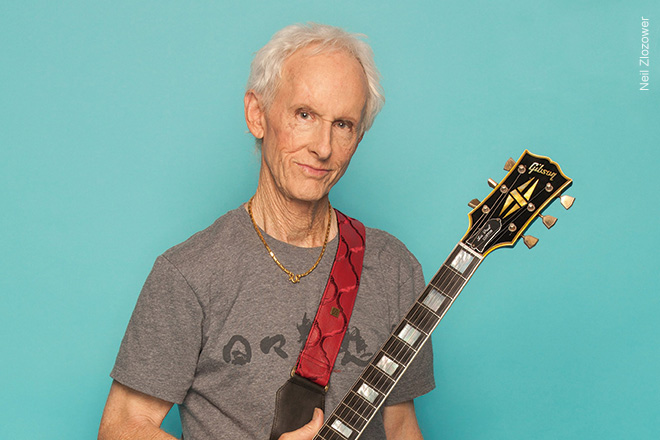ROBBY KRIEGER
The innovative Doors guitarist wants fans to know the band’s real story
Director Oliver Stone’s 1991 biopic The Doors offered many insights into the legendary group’s music. Now, with the release of the Doors’ self-produced 1968 film documentary Feast of Friends, fans have access to a more realistic depiction of band members’ lives and their creative process. At its center is Robby Krieger, whose dazzling guitar work helped spark magic with singer Jim Morrison—who died in 1971—keyboardist Ray Manzarek and drummer John Densmore. “Somehow we gelled perfectly,” says Krieger, 68, who wrote many of the band’s hits, including “Light My Fire.” “If any one of us hadn’t been there, it wouldn’t have worked.”
Whose idea was it to make this?
Jim, Ray and I were students at UCLA—but they were in the film department and were big film nuts. On our first tour we decided to get some of our UCLA buddies to follow us around with a camera. We didn’t know what it was going to be. Jim liked to say, “Let the film make itself.” We wanted it to be feature-length, but we ended up with only 45 minutes we were happy with. Eventually we thought, “Let’s just put it out the way it was supposed to be, even though it isn’t complete.”
Morrison seems like an average guy.
That’s the cool thing about it. The Oliver Stone movie gave the impression that Jim was a total weirdo, 24/7. People find it hard to believe Jim could be a normal person—a good friend and a great guy. As he started drinking too much that became less apparent, but deep down he was always that same guy.
You originally wrote “Light My Fire” as a folk song?
That’s right. I was listening to artists like the Byrds and the Leaves. I came up with folk-rock chords, but fortunately John put that Latin beat to it. I really don’t know what kind of music you would call “Light My Fire.” There’s a folk-rock and East Indian influence—and John Coltrane chords in the solo.
Did you and Morrison find the time to write together?
We did quite a bit. Sometimes he would have lyrics, and either Ray or I would put music to it. Other times I would have some chords and he would put words to them. It happened in all sorts of ways. Later I would write some music and then we would look through Jim’s poetry books to find ideas for lyrics. Jim was really good at finding the right words for the music.
Any happy accidents?
The solo in “When the Music’s Over” is actually two solos playing at once. [Producer] Paul Rothchild had modified the input of the mixing board to give the guitar a violin sound. That made it easy for me to play what I was trying to play, which was basically Coltrane. I did one solo I kind of liked, and Paul said, “Let’s do another.” We ended up doing three or four—and by accident our engineer played two at once as we were listening to the playback. It worked perfectly—one of those magic moments.
How’d you feel about the Stone film?
There are some good things. I actually worked as an advisor for the musical parts. I wanted to make sure they were as true to life as possible. And I thought Val Kilmer was amazing, but that the script was kind of bad—it only showed the crazy side of Jim. Much of the time, as the Feast of Friends documentary shows, Jim was a normal guy. I hope people will see this film and weigh it against the Oliver Stone depiction.
–Russell Hall




comment closed